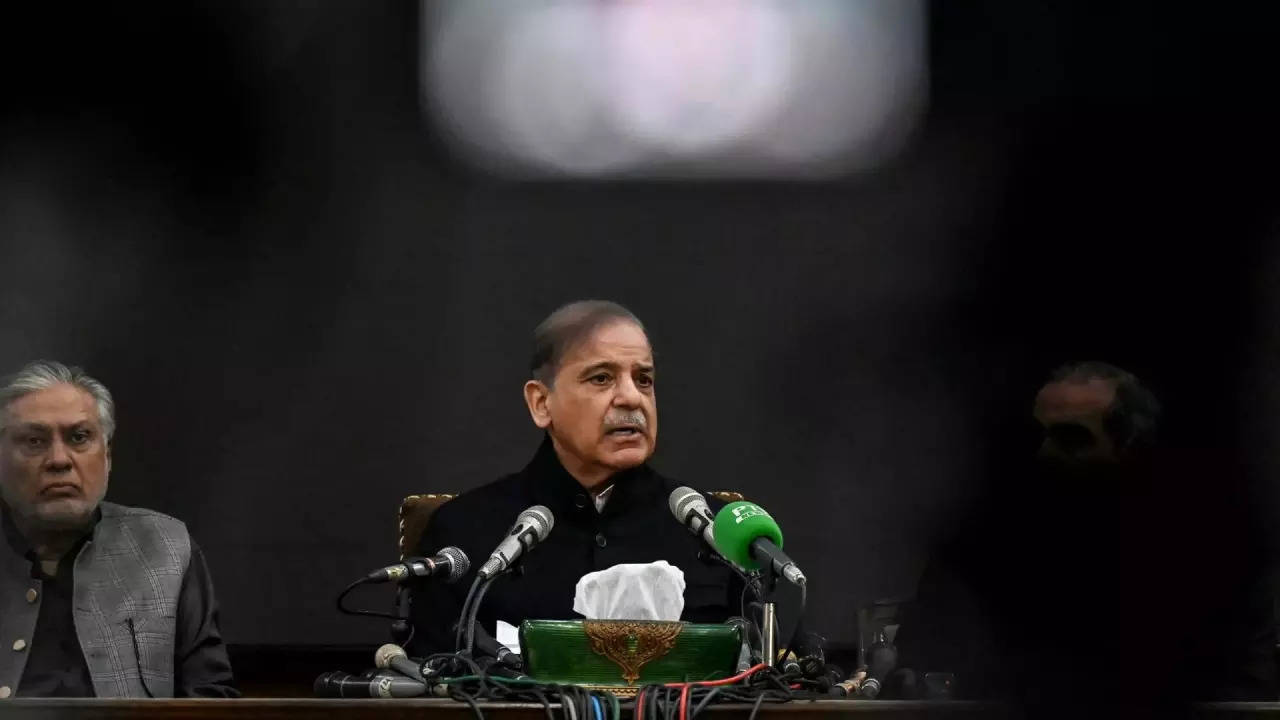ISLAMABAD: Pakistan prime minister Shehbaz Sharif said on Tuesday that his trip to China last week was successful, while the opposition parties took him head-on, describing the tour as one that focused mainly on the security of Chinese people in Pakistan.
Sharif’s visit came as Islamabad is seeking more foreign investment and looking to boost exports in a time of economic crisis and security concerns.
Accompanied by the powerful army chief, General Asim Munir, Sharif took more than 100 Pakistani businessmen with him.
Apprising cabinet members of his visit, PM Sharif said that despite the security issue highlighted during engagements with the Chinese leadership and business community, his five-day visit concluded on a “positive note”.
“During the conversation with the Chinese ambassador at the banquet hosted by the Communist Party secretary during my visit to Shanxi province, I got a deep feeling that the visit remained very successful,” Sharif remarked, adding that a high-powered Chinese delegation would visit Pakistan soon.
A joint statement issued at the end of the visit had stated that China and Pakistan had signed 23 agreements and MoUs in different fields. The joint declaration, however, noted that Beijing would not push businesses to take unwarranted risks or make concessions to Pakistani companies. Instead, the statement said, Beijing would support businesses to invest in Pakistan in line with market and commercial principles.
Observers, however, pointed out that obstacles still stand in the way of strengthening Beijing-Islamabad economic collaboration, primarily as a result of Pakistan’s misguided policies.
Pakistan is currently experiencing a debt crisis and looking for new loans to pay off previous debt.
The total debt that Pakistan owes just to power (electricity) plants established under the China Pakistan Economic Corridor (CPEC) stands at around $7.5 billion. Islamabad also owes nearly $2 billion in circular debt, or unpaid bills, to Chinese electricity producers.
During Sharif’s visit, no public statement was issued on restructuring debt but experts believe the issue is crucial and cannot be ignored.
Pakistan’s current foreign debt, media reports suggest, is close to $130 billion, and Chinese officials say around 13% of it is owed to China.
During the visit, Sharif, along with Gen Munir, also held talks with Chinese president Xi Jinping for more than three hours, indicating that the security of its nationals in Pakistan is a key concern for Beijing. Five Chinese workers were killed in a suicide attack in Pakistan’s northwestern Bisham region in March. Pakistan had blamed Afghanistan-based terrorists for the attack. The ruling Afghan Taliban had rejected Pakistan’s claim, saying Islamabad was trying to sour Kabul’s relations with Beijing.
In the joint statement, both sides urged Afghanistan to “firmly combat terrorism, including not allowing its territory to be used for terrorist acts”.
Sharif’s visit came as Islamabad is seeking more foreign investment and looking to boost exports in a time of economic crisis and security concerns.
Accompanied by the powerful army chief, General Asim Munir, Sharif took more than 100 Pakistani businessmen with him.
Apprising cabinet members of his visit, PM Sharif said that despite the security issue highlighted during engagements with the Chinese leadership and business community, his five-day visit concluded on a “positive note”.
“During the conversation with the Chinese ambassador at the banquet hosted by the Communist Party secretary during my visit to Shanxi province, I got a deep feeling that the visit remained very successful,” Sharif remarked, adding that a high-powered Chinese delegation would visit Pakistan soon.
A joint statement issued at the end of the visit had stated that China and Pakistan had signed 23 agreements and MoUs in different fields. The joint declaration, however, noted that Beijing would not push businesses to take unwarranted risks or make concessions to Pakistani companies. Instead, the statement said, Beijing would support businesses to invest in Pakistan in line with market and commercial principles.
Observers, however, pointed out that obstacles still stand in the way of strengthening Beijing-Islamabad economic collaboration, primarily as a result of Pakistan’s misguided policies.
Pakistan is currently experiencing a debt crisis and looking for new loans to pay off previous debt.
The total debt that Pakistan owes just to power (electricity) plants established under the China Pakistan Economic Corridor (CPEC) stands at around $7.5 billion. Islamabad also owes nearly $2 billion in circular debt, or unpaid bills, to Chinese electricity producers.
During Sharif’s visit, no public statement was issued on restructuring debt but experts believe the issue is crucial and cannot be ignored.
Pakistan’s current foreign debt, media reports suggest, is close to $130 billion, and Chinese officials say around 13% of it is owed to China.
During the visit, Sharif, along with Gen Munir, also held talks with Chinese president Xi Jinping for more than three hours, indicating that the security of its nationals in Pakistan is a key concern for Beijing. Five Chinese workers were killed in a suicide attack in Pakistan’s northwestern Bisham region in March. Pakistan had blamed Afghanistan-based terrorists for the attack. The ruling Afghan Taliban had rejected Pakistan’s claim, saying Islamabad was trying to sour Kabul’s relations with Beijing.
In the joint statement, both sides urged Afghanistan to “firmly combat terrorism, including not allowing its territory to be used for terrorist acts”.
